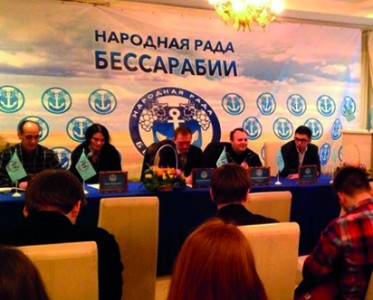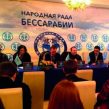
Ukraine Defuses Pro-Russia Instigations in Odesa Province
Publication: Eurasia Daily Monitor Volume: 12 Issue: 66
By:

President Petro Poroshenko recently instructed the Security Service of Ukraine (SBU) to “nip any separatist organizations in the bud […] so that Ukraine should not again have to pay a heavy price later on,” as is now the case in Donetsk-Luhansk (Dzerkalo Tyzhnia, March 25). In the spirit of preventive action, Ukrainian law enforcement agencies have arrested some 20 members of a centrifugal organization in Odesa province, the latest such organization to have emerged in Ukraine. The timely intervention also stopped the publicity bandwagon that had just started rolling from Moscow in support of the Odesa group (TASS, Nezavisimaya Gazeta, April 8).
On April 6 in Odesa, a “Narodnaya Rada Bessarabii” (Bessarabian People’s Rada—“BPR”) held its inaugural conference, calling for autonomy of that multi-ethnic territory. The “BPR” emerged practically overnight, its website’s domain name being registered in the City of Moscow (rada-bessarabia.org). The “BPR” is, from inception, connected with pro-Russia groups in Ukraine’s Odesa province and in nearby Moldova.
The “people’s Rada” claims to represent the ethnic communities in the Bessarabian part of Odesa province and demands a “special status” for this part. Its multi-ethnic mix (Ukrainians, Bulgarians, Russians, Moldovans, Gagauz) is similar with the mix across the border in southern Moldova (Moldovans, Gagauz, Bulgarians, Russians, Ukrainians), that being also a part of Bessarabia. As the choice of the term “Bessarabia” implies, the “BPR” seems designed to promote a centrifugal agenda against Kyiv and Chisinau, respectively, on either side of the border in southern Bessarabia. These territories are the most diverse, by far, in their ethnic composition in all of Ukraine and all of Moldova, respectively.
The “BPR” president, Dmitry Zatuliveter, is concurrently the head of a “Union of Transnistrians in Ukraine.” In his speech at “BPR’s” conference, he announced, “We see our mission as achieving a status of national-cultural autonomy for Bessarabia” (Rada-bessarabia.org, April 6). While the priority target is clearly the Ukrainian part of this territory, the choice of the term Bessarabia implies that the Moldovan part is the next potential target.
Documents posted on “BPR’s” website and approved at the conference (an introductory statement, a program and a manifesto) include demands for: greater representation of ethnic groups in the administration of Ukraine’s Odesa province; promotion of the ethnic groups’ cultural identities and schools; conferral of a “national-cultural special status” to Bessarabia; a free economic zone, with specific reference to local control over Ukraine’s Black Sea and Danube ports; no integration of Ukraine with the European Union, the “enslavement practices of which would ruin the region and its agriculture”; and reinstatement of Ukraine’s [recently abandoned] international status of nonalignment, or else: “In the event of Ukraine moving close to NATO [the North Atlantic Treaty Organization], we reserve the right to implement the self-determination of Bessarabia” (Rada-bessarabia.org, Dumskaya.net, accessed April 8).
The founding conference designated a “people’s Rada” comprised of 21 “deputies.” It claims the role of “representative body for the protection of the interests of Bessarabia’s ethnic communities.” Described as a “new form of self-organization of Bessarabians,” the “BPR” proposes to enter into discussions with Ukraine’s authorities. While the word “self” implicitly concedes its lack of a mandate from anybody (it was also used by secessionists in Crimea and Donetsk-Luhansk in the incipient phase of their movement), the dialogue offer implies the goal achieving some kind of quasi-recognition.
Participants in the conference included a few members of locally elected administrations in Odesa province, a few pro-Russia/pro-Novorossiya Internet activists, uncaptioned organizers, and a sprinkling of students. The delegate from Moldova’s Party of Socialists sat in the presidium and delivered party leader Igor Dodon’s salute. A few like-minded activists from Chisinau and Tiraspol attended. The “BPR president” Zatuliveter (see above) is billed as an entrepreneur (unspecified). At least until recently, he was associated with a Trasnsnistrian group that had fallen out with “president” Yevgeny Shevchuk there (Tiras.ru, Timer-odessa.net, Ava.md, April 6–8).
The Bulgarian party Ataka, probably fronting for Russia, functions as a link between the “people’s Rada” and the outer “Russian world.” The head of Ataka’s youth wing sat in the “BPR” conference presidium. A public relations firm in Bulgaria, dubbed “European communication center,” is the “BPR’s” partner in that country; and it issued a protest against the arrest of “BPR” activists in Odesa (Rada-bessarabia.org, April 9).
The Bulgarian ethnic minority is pivotal in southern Bessarabia on either side of the Ukraine-Moldova border. Accordingly, Russia uses that conduit from Bulgaria for this Bessarabian project. Similarly, Moscow has been using the Jobbik party from Hungary as a conduit for manipulative ethnic politics in Ukraine’s Transcarpathian province.
The “people’s Rada’s” inaugural event avoided inflammatory language or outright calls for “separatism,” which could have resulted in criminal liabilities in Ukraine. The “BPR’s” published agenda seems designed to develop gradually, and includes an already stated goal to change Ukraine’s external orientation. This is a group of individuals with an ambitious agenda and a network of connections beyond Odesa province; but it lacks any kind of mandate, political base, organization, or leaders with name recognition. Russian support seems to have plucked this group out of nowhere.
The would-be “Rada” evidently planned to develop a following among ethnic communities. Apparently the intent was to counter the national government’s policies through centrifugal movements in the periphery. Such an approach corresponds with the initial phase of what then developed in due course as Russia-orchestrated “frozen conflicts.” To attain a capacity for ethnic mobilization, however, the “BPR” would have had to compete against the established leaders of the ethnic communities in Odesa province. The Bulgarian and Gagauz community leaders in the province are loyal to Ukraine and have distanced themselves unambiguously from the “BPR.”




